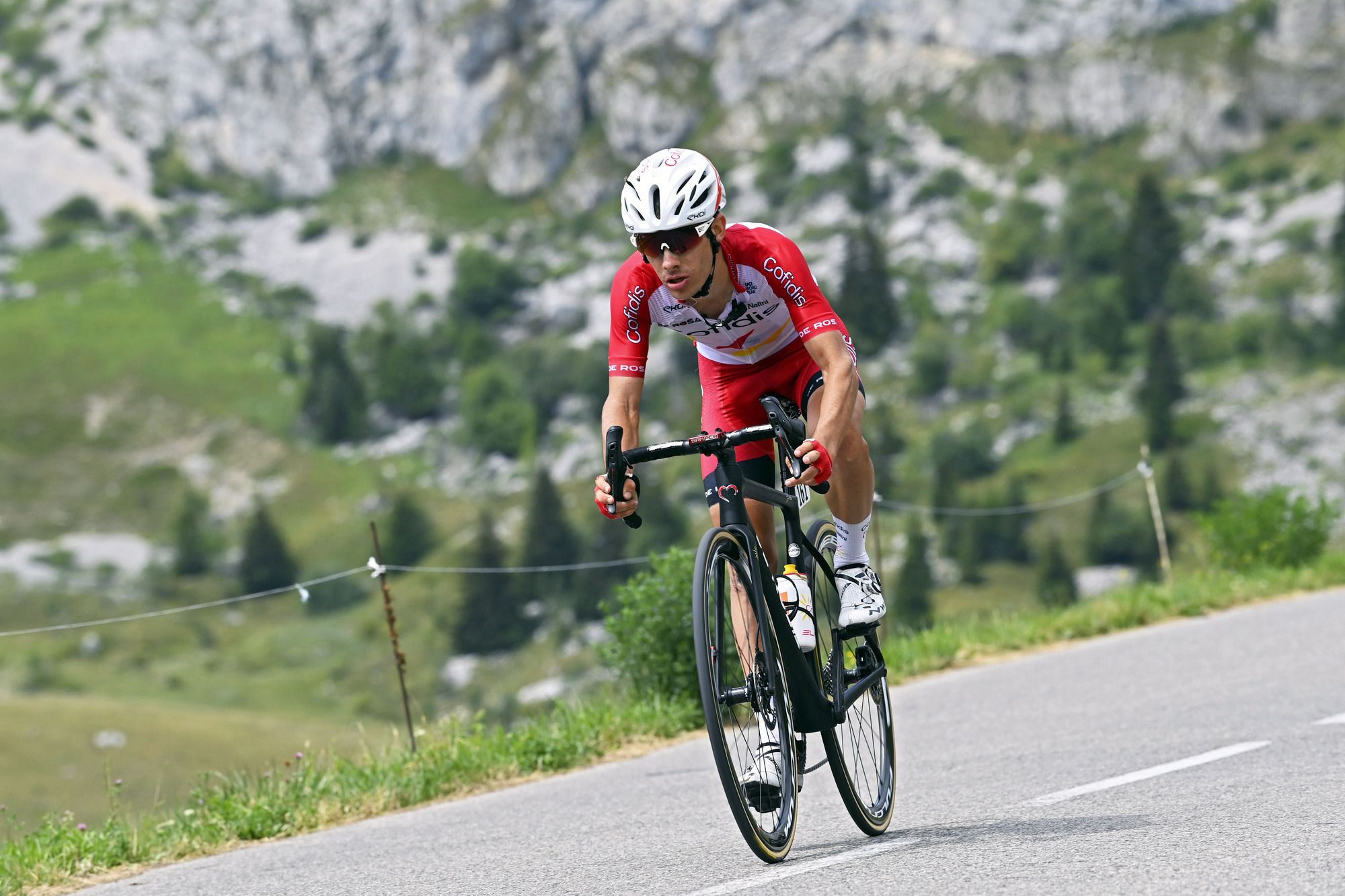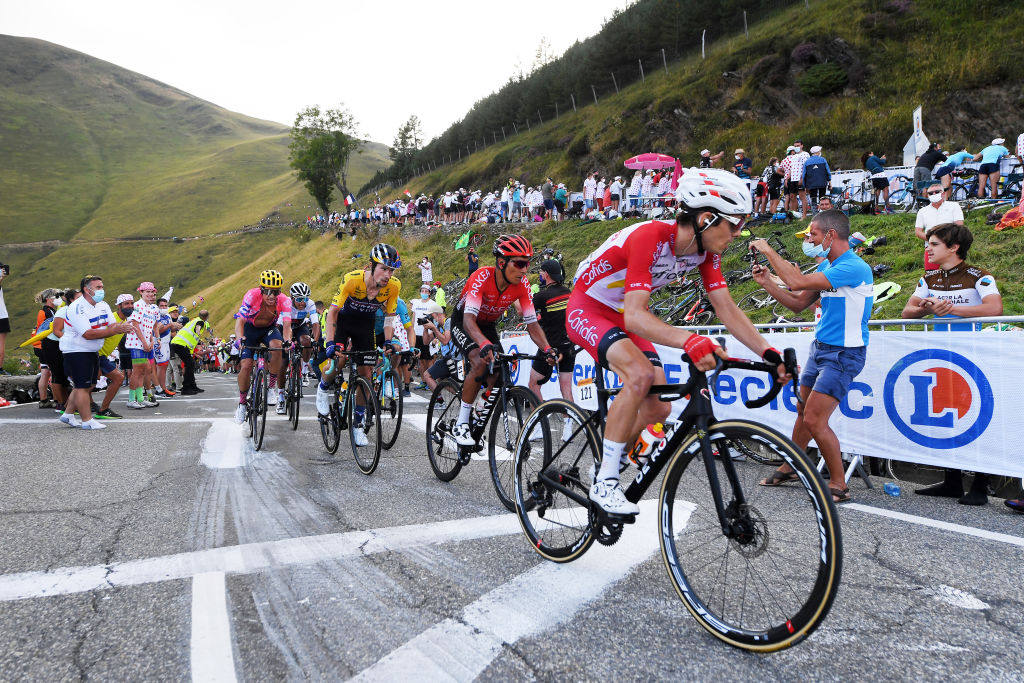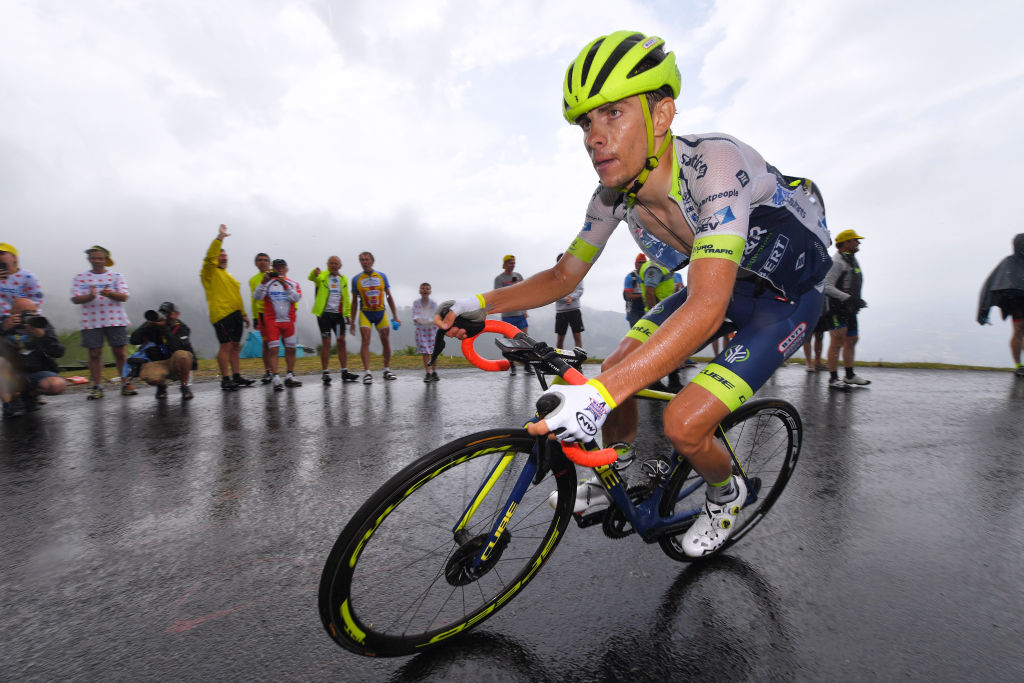Guillaume Martin: Think big
Procycling speaks to the French climber about his start in the cycling, studying philosophy, drama and learning martial arts

Guillaume Martin was one of France’s top amateurs, but he unusually turned pro with Belgian team Wanty-Groupe Gobert, before joining Cofidis this year. He has a Masters in philosophy, wrote a play about Plato and studied martial arts. Procycling sat down with a most unconventional climber back in 2018
This article was taken from Procycling magazine, issue 252 February 2019
As part of our autumn sale a subscription to Procycling magazine currently costs £5 for the first five issues (UK offer only) – that's only £1 per issue.
PC: What do you remember about your start in cycling? Your father was a fan of the sport…
GM: My father rode when he was young, when he was 20, and later on he just stopped with cycling. But when I was young, he started watching some regional races and watching races on the TV. He has a competitive instinct and I think he gave it to me. I don’t know if it comes from him or if it’s natural for me. But as long as I remember, I liked competition. When I was six, seven years old, I was riding in my courtyard doing time trials against myself, and the day after I wanted to improve my time.
PC: Cycling is such a big sport in France, but were many of your friends and peers also riding bikes when you were growing up?
GM: No, no, no, in most of the country football is the king sport. I played some football when I was between six and nine years old but I didn’t like to practice team sport that much. Cycling is a collective sport but it’s different. I did it on my own. When I started cycling I was in a really small club so I was the only one of my age in my category and I did everything on my own. But I think I was the only one to do cycling.
Get The Leadout Newsletter
The latest race content, interviews, features, reviews and expert buying guides, direct to your inbox!
PC: Your father is a martial arts teacher, and you used to participate too when you were younger. What did that sport teach you?
GM: He’s still doing it a little bit, but officially he’s retired. It’s a special environment. I did it from four to 14 – 10 years. I think it helped me. When I crash, as happens in cycling, I – touch wood – never break anything, so I think I have some reflexes. It helped me also to be focused. What’s funny is that the martial art that my father did was aikido and it’s a martial art without competition, but my father has a big instinct for competition and me also. I think that’s what I didn’t like in aikido. It’s all about… both [mental and physical strength]. It’s not like tai chi or yoga, it’s all about working with the partner, not against a partner.
PC: You had a lot of success in cycling when you were young. Was there a point when you realised cycling could be a career?
GM: When I signed my first contract. It’s not in my temperament to think about the future and to make plans. I did what I liked; I liked cycling, I liked philosophy, so I studied philosophy without any plan. When you study philosophy, you don’t have a specific job after – a teacher maybe, but I didn’t want to be a teacher. I took cycling seriously, because I wanted to become professional, but when you’re not, it seems like a really strange and foreign world. And then it happened, and a lot of things happened after.
PC: You clearly had a talent for cycling and often you like what you’re good at...
GM:If I was the last one always, because I have competitive instincts, I don’t like to lose. If I always lost I would have stopped and done something else.

PC: You’re a climber. What influenced you to become that type of rider?
GM: I am 1m 74cm, I am 55 kilos, of course I am better in climbs rather than in echelons. It’s also what I like in cycling. When I was watching cycling on TV I liked climbing races and I grew up in a place in Normandy called La Suisse Normande; it’s like Switzerland, it looks a little like Switzerland. Everybody thinks Normandy is completely flat and maybe because they only know it from the Tour de Normandie, which is always flat and echelons, but my place is quite hard. There are climbs that are 5km and really steep. I liked starting cycling in that area.
PC: Your first coach Bruno Lepape played a big role in your development. How much of an influence did he have on your career now?
GM: I started working with him when I was 15, even younger, I think 14. It was in high school because there is a system in France when in school you can have cycling or sport as a subject like math or something else. He was in charge of this. We developed a special relationship. He was always focused on not asking too much. You know, when you deal with athletes who are not completely grown or developed you have to take care, and he took a lot of care.
We were a group of 15 children, there was a combination of fighting each other and we improved like this, it was a special atmosphere. I continued training even after high school and I was really passionate. That’s what I liked with him. He’s still a friend and he is still following my races, sometimes with too much passion. He’s also a friend of my father and I think they call each other 10 times during a race [when I am taking part].
PC: You were tipped as a future cycling talent from a young age. Did you feel there was a lot of expectation around you?
GM: Maybe my chance was that I belong to a generation with many good riders in France. Before us there was Barguil and Bardet, and in my generation there is Latour, Sénéchal, Gougeard and a lot more. The pressure was split. I never had real difficulties with pressure, it’s maybe something that I like. Now with Wanty, as a leader, it’s not something that I fear, it’s something that I am looking for. It was never a problem for me.
PC: Is it true in 2015 you thought if you didn’t get a contract you’d leave cycling and go and do something else?
GM: As I told you, I’m not a person who makes a lot of plans. In the end I am also realistic. I started to look a little bit at schools, for example journalism schools. But I didn’t give up [on cycling] until the end of the season and eventually the contract happened. It was a happy end.

PC: You had a traineeship in 2014 with FDJ but they chose not to sign you. It’s unusual for a French rider to not progress through French teams. Why did you sign for Wanty Groupe Gobert, a non-French team?
GM: That was a strange period, a strange two years. I was training with FDJ, not the year I became professional but the year before. I did three one-day races with them and it went quite well. Okay, I understood that they didn’t take me at that moment because I didn’t have really good results. But the year after I had these wins [in the Tour de l’Avenir and U23 Liège] and I had no news from FDJ. I never knew why. That was strange. From other teams I had contact, but contact is not a proposal, so I waited
and waited and eventually the offer from Wanty came, and now, looking back, it was the best opportunity for me.
PC: How different is Wanty, a Belgian team, from the French system you grew up in?
GM: When I joined the team I felt the passion for cycling, even more than in France. In Belgium, cycling is a religion. From all the staff you feel that passion that I am looking for. I really liked that. Wanty, especially when I entered the team, was still quite a small team with a family spirit. That’s also what I like – to be in a family team, but also a team that wants to challenge the big teams, and to do it as seriously as we can to improve. Now I am really part of the project now and I want to develop and that’s also what I like now – to be not only a rider on the team but also thinking of the whole project.
PC: You mentioned you also have a Masters in philosophy, and you wrote your thesis on Nietzsche. Why did that subject appeal to you?
GM: I liked it, I had a really good philosophy teacher when I was 19 and he gave me the desire to continue. At first, sport and philosophy were two completely different things, and I did not want to link them – as if I were schizophrenic, they were two completely different things. But when I started my Masters, then I started to want to link them, and I started to think about sport from a philosophical point of view. There was also a philosopher that I really liked, Nietzsche. I think I liked him because his way of thinking really talked to a sportsman. I wanted to link all of it.
PC: Your mother was a drama teacher, is that partly how you were inspired to write a play of your own?
GM: I acted in a play when I was 10 or something and then completely stopped. It wasn’t something that I really liked. I liked reading and I still like it, but acting, no. I wrote a play; that wasn’t because I liked theatre, it was because I didn’t like it. I was watching plays and I was always bored there and so I wanted to... it was a private joke just for me. I wanted to write a play that wasn’t boring, that was funny but also clever. You know, in theatre, it’s a strange world, it’s either only funny but it has no deepness, substance to it, or it’s really, really serious and it’s boring.
The basics of it was philosophy again. I started from the life of Plato, a Greek philosopher, and I did something and it was a funny play talking about philosophy in a funny way. It’s about the duplicity of Plato, he’s a big thinker, known in Athens, but I say that in his deep soul he is missing something and he’s missing fun, he’s missing sport, he criticises a lot of artists and maybe I say it’s because he wants to be an artist.
As part of our autumn sale a subscription to Procycling magazine currently costs £5 for the first five issues (UK offer only) – that's only £1 per issue.
Sophie Hurcom is Procycling’s deputy editor. She joined the magazine in 2017, after working at Cycling Weekly where she started on work experience before becoming a sub editor, and then news and features writer. Prior to that, she graduated from City University London with a Masters degree in magazine journalism. Sophie has since reported from races all over the world, including multiple Tours de France, where she was thrown in at the deep end by making her race debut in 2014 on the stage that Chris Froome crashed out on the Roubaix cobbles.